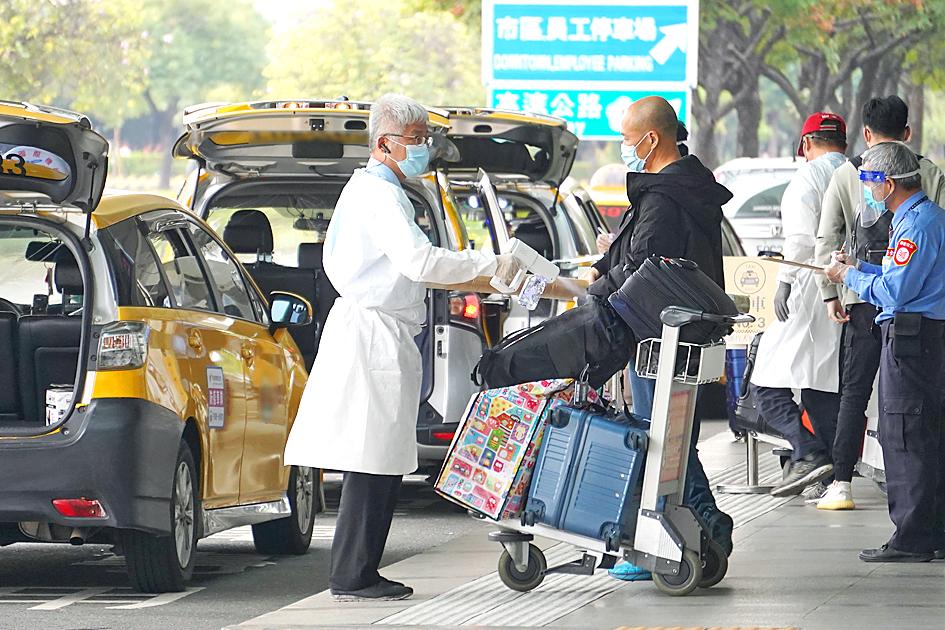Thirty-nine hotels across Taiwan have stopped accepting guests who need to quarantine due to COVID-19 pandemic rules, as demand has declined after the Lunar New Year holiday, the Tourism Bureau said yesterday.
The demand for quarantine hotel rooms surged after the Central Epidemic Command Center (CECC) on Dec. 14 last year implemented a special quarantine policy for overseas Taiwanese returning home for the holiday, which ended on Sunday.
They were required to stay in quarantine hotels or government quarantine facilities for seven to 14 days, depending on their COVID-19 vaccination status. The policy is to end on Feb. 28.

Photo: CNA
Bureau statistics showed that 32,000 quarantine hotel rooms were available before the start of the holiday.
By Saturday, the number had dropped to about 30,000, with the occupancy rate shrinking to 37 percent from 50 percent in early December.
Most of the hotels opting out of the quarantine services are in Taipei, New Taipei City, Taoyuan, Taichung, Tainan and Kaohsiung, the bureau said.
Of the 2,000 quarantine rooms at those hotels, 800 were only available until Monday last week, it added.
Hotels that offered quarantine services should be disinfected for more than one day before accepting regular guests again, it said.
“Hoteliers make adjustments based on demand, and we respect their decisions,” bureau Deputy Director-General Chou Ting-chang (周廷彰) said.
In other news, Taiwan Taoyuan International Airport was yesterday awarded Airports Council International’s The Voice of the Customer prize, for “listening and adapting to customers during the pandemic.”
The Montreal-based organization last year began recognizing airports valuing input from passengers and recognized the efforts made by Taiwan’s largest airport for a second time in a row.
To receive the recognition, an airport must collect data for three quarters or longer and quickly adapt to changing demands of passengers, the airport operator said.
“Although the pandemic has caused the airport’s passenger volume to drop dramatically, we continue to listen to travelers and have offered facilities that would reduce their risks of contacting COVID-19, such as setting up ultraviolet bacteriostatic cabins to disinfect inbound passengers, adding ultraviolet germicidal lamps to the air-conditioning system in airport terminals and deploying ultraviolet disinfection robots in high-risk areas inside terminals,” it said.
As the International Air Transport Association has forecast that global passenger numbers would in 2024 return to 2019 levels if the pandemic continues to abate, the airport operator said that it would prepare for the expected recovery by enforcing the CECC’s disease prevention measures and ensuring that the planned Terminal 3 and a third runway would be completed as scheduled.

The Ministry of Economic Affairs has fined Taobao NT$1.2 million (US$36,912) for advertisements that exceed its approved business scope, requiring the Chinese e-commerce platform to make corrections in the first half of this year or its license may be revoked. Lawmakers have called for stricter enforcement of Chinese e-commerce platforms and measures to prevent China from laundering its goods through Taiwan in response to US President Donald Trump’s heavy tariffs on China. The Legislative Yuan’s Finance Committee met today to discuss policies to prevent China from dumping goods in Taiwan, inviting government agencies to report. Democratic Progressive Party Legislator Kuo Kuo-wen (郭國文) said

The Ministry of Economic Affairs has fined Taobao NT$1.2 million (US$36,900) for advertisements that exceeded its approved business scope and ordered the Chinese e-commerce platform to make corrections in the first half of this year or its license would be revoked. Lawmakers have called for stricter supervision of Chinese e-commerce platforms and more stringent measures to prevent China from laundering its goods through Taiwan as US President Donald Trump’s administration cracks down on origin laundering. The legislature’s Finance Committee yesterday met to discuss policies to prevent China from dumping goods in Taiwan, inviting government agencies to report on the matter. Democratic Progressive Party

Taiwan and its Pacific ally Tuvalu on Tuesday signed two accords aimed at facilitating bilateral cooperation on labor affairs, according to Taiwan’s Ministry of Foreign Affairs (MOFA). The governments inked two agreements in Taipei, witnessed by Foreign Minister Lin Chia-lung (林佳龍) and visiting Deputy Tuvaluan Prime Minister Panapasi Nelesone, MOFA said in a news release. According to MOFA, the agreements will facilitate cooperation on labor issues and allow the two sides to mutually recognize seafarers’ certificates and related training. Taiwan would also continue to collaborate with Tuvalu across various fields to promote economic prosperity as well as the well-being of their

Sung Chien-liang (宋建樑), who led efforts to recall Democratic Progressive Party (DPP) Legislator Lee Kun-cheng (李坤城), was released on bail of NT$80,000 today amid outcry over his decision to wear a Nazi armband to questioning the night before. Sung arrived at the New Taipei District Prosecutors’ Office for questioning in a recall petition forgery case last night wearing a red armband bearing a swastika, carrying a copy of Adolf Hitler’s Mein Kampf and giving a Nazi salute. Sung left the building at 1:15am without the armband and covering the book with his coat. Lee said today that this is a serious